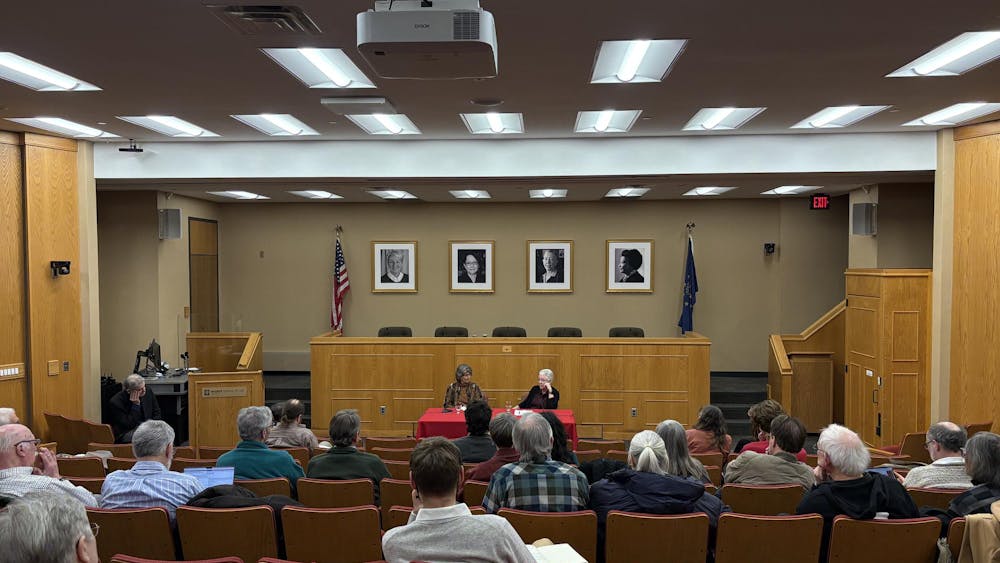Martin Kramer, an internationally recognized expert on Islam and Arabic politics, delivered a speech entitled, "Middle Eastern Studies in America and 9/11: What Went Wrong," to a crowd of more than 100 Tuesday night.\nKramer, editor of the Middle East Quarterly, is the author of several books including his most recent, Ivory Towers on Sand: The Failure of Middle Eastern Studies in America, which has achieved international acclaim. \nKemal Silay, chair professor of Ottoman and Modern Turkish Studies, hailed Ivory Towers in his introduction to Kramer's speech as "one of the most courageous works on the subject of Middle Eastern affairs."\n"(Kramer) is one of the strongest voices in contemporary Middle Eastern studies, and I truly believe that his work will make a difference," Silay said.\nKramer began his lecture by professing his gratitude for being invited to discuss the state of Middle Eastern affairs in America on a college campus.\n"There is still a fear on some campuses of an open discussion of (Middle Eastern studies)," Kramer said. "But the place where I would like to see this subject debated is here, on the campus, because if discussions and debates are blocked from the campus, they will be conducted by rules and conventions that are not academic. And that would be a pity."\nKramer then dove into the heart of his theory by presenting views that he feels suggest the occurrence of Sept. 11 came at the failure of Middle Eastern studies in America, saying the Middle East experts ignored signs that should have warned them about terrorist threats.\n"Nothing you would have read from Middle Eastern scholars would have given you the least inkling that 9-11 was possible," Kramer said. "It was (in America) that one found the denial of terrorism, and it was here that one held contempt for the few journalists who said mega-terrorism from the Middle East was possible."\nKramer attributed the scholars' failure in foreseeing Sept. 11 to oversympathizing by experts in identifying with the people and societies they study.\n"(Middle Eastern scholars) study out of a sympathy for Middle Easterners," Kramer said, "and they want to believe and persuade you and I that the Middle East is not some black monster, but rather that it's inhabited by people like us with whom we share a fundamental humanity. The scholars were incapable of identifying the unique features of the Middle East and the dangers that they possess."\nDanusha Goska, a Ph.D. student at IU, said Kramer's honest and critical approach towards Middle Eastern studies was a refreshing change from the media's handling of the subject. \n"I was outraged with the way in which the media dealt with foreign policy after 9-11," Goska said. "And then I found (Kramer), and he's a voice who says 'let's be critical, let's start thinking for ourselves.' He tells you exactly what he thinks without pulling any punches."\nKramer's speech was followed by an extensive and, at times, heated Q and A session in which he answered and argued with audience members over issues concerning his critical views in his books and the present situation in the Middle East. \nNonetheless, Kramer seemed to enjoy the debate with the audience. Each time Silay would announce that the question session was over, Kramer would prolong the debate for audience members who still wished to voice their opinions.\nSilay said he wasn't at all surprised by the animated interaction between Kramer and the audience.\n"One of the reasons I wanted (Kramer) to speak on campus was because I realized that not everybody agrees with his ideas," Silay said. "There is nothing wrong with discussing things openly; everyone should have a voice."\nKramer concluded his lecture with a specific message to the students in the audience; he professed the importance of the revival of contemporary Middle Eastern studies.\n"Now is the most exciting time in Middle Eastern studies in 20 years," Kramer said. "This is not the time to make professions of allegiance or embattle with professors. It is a time to read, and to think and to make your own judgments. The World Trade Center is gone, but something else will rise. The space is there"
Expert wants more Mideast studies
Get stories like this in your inbox
Subscribe





